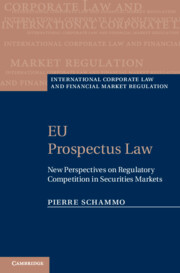Book contents
- Frontmatter
- Contents
- Preface and acknowledgements
- List of abbreviations
- Table of cases
- Table of legislation
- Introduction
- PART I Prospectus disclosure in a wider institutional context
- PART II Prospectus disclosure regulation
- PART III Prospectus disclosure enforcement
- PART IV Prospectus disclosure and regulatory competition
- 8 Introduction
- 9 Regulatory competition and EU decision-making
- 10 Regulatory competition and the prospectus directive: the issuer choice policy dispute
- PART V Conclusions and suggestions for the future
- Select bibliography
- Index
- References
9 - Regulatory competition and EU decision-making
from PART IV - Prospectus disclosure and regulatory competition
Published online by Cambridge University Press: 01 June 2011
- Frontmatter
- Contents
- Preface and acknowledgements
- List of abbreviations
- Table of cases
- Table of legislation
- Introduction
- PART I Prospectus disclosure in a wider institutional context
- PART II Prospectus disclosure regulation
- PART III Prospectus disclosure enforcement
- PART IV Prospectus disclosure and regulatory competition
- 8 Introduction
- 9 Regulatory competition and EU decision-making
- 10 Regulatory competition and the prospectus directive: the issuer choice policy dispute
- PART V Conclusions and suggestions for the future
- Select bibliography
- Index
- References
Summary
Introduction
Chapter 8 discussed the theory of regulatory competition critically. As a reminder, regulatory competition can be described, in optimistic terms, as an institutional arrangement which contributes to keeping self-interested regulators (or policy-makers) in check and which may fuel regulatory policy learning. But, as stressed in Chapter 8, there are good reasons for being critical of the theory. It not only suffers from flaws and weaknesses, but its message in favour of competitive regulatory decision-making is increasingly at odds with the real world. Against this background, Chapter 8 suggested abandoning normative theory for good and concentrating instead on empirical work, especially on how the threat of regulatory arbitrage affects EU decision-making. The aim of this chapter is to begin investigating these questions and, ultimately, to draw lessons for the literature interested in prospectus disclosure regulation. This chapter contains the theoretical part. The next chapter will deal with the empirical part. As elsewhere in the book, I will use the term ‘regulation’ in its widest sense, as market regulation instead of simply rule-making. Section II begins by describing regulatory competition as a regulatory problem that the EU legislature faces when attempting to support market integration and from there develops a research perspective. Section III turns to the political science literature for insights on the mechanics of EU decision-making and examines, in particular, the role of two broad sets of factors, actor preferences and institutions.
- Type
- Chapter
- Information
- EU Prospectus LawNew Perspectives on Regulatory Competition in Securities Markets, pp. 288 - 308Publisher: Cambridge University PressPrint publication year: 2011

